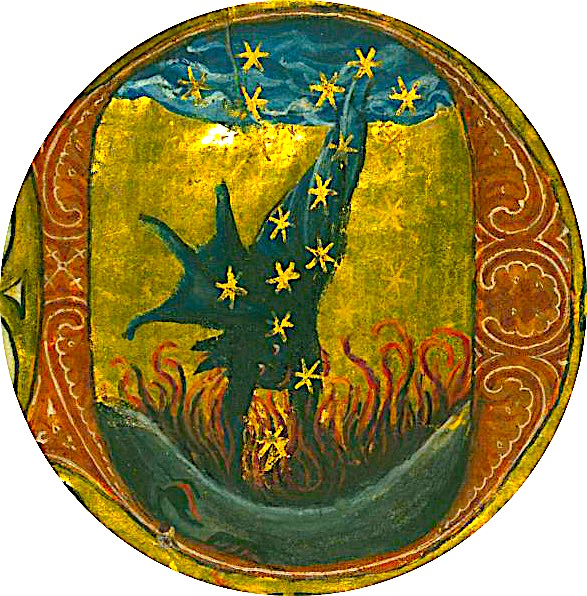Revised: 16-November-2017
I saw Satan falling like lightning from heaven.
(Luke 10:18)
| Rather listen instead? |
| JP members can click the link below for an audio version of this essay.[*] Paid Content If you do not have a paid subscription, please consider registering as a Premium Member starting at $10/month (paid monthly) or only $5/month (paid annually): Register One Time Purchase Rather Than Membership  |
Luke 10:18 is unique in that it records the only apocalyptic[1] vision attributed to Jesus in the Synoptic Gospels.[2] According to Luke, Jesus described his vision of Satan’s expulsion from heaven in response to the apostles’ report of the successful exorcisms they performed in the course of their missionary endeavor.
Paid Content
Premium Members and Friends of JP must be logged in to access this content: Login
If you do not have a paid subscription, please consider registering as a Premium Member starting at $10/month (paid monthly) or only $5/month (paid annually): Register
One Time Purchase Rather Than Membership
Rather than purchasing a membership subscription, you may purchase access to this single page for $1.99 USD. To purchase access we strongly encourage users to first register for a free account with JP (Register), which will make the process of accessing your purchase much simpler. Once you have registered you may login and purchase access to this page at this link:
Paid Content
Premium Members and Friends of JP must be logged in to access this content: Login
If you do not have a paid subscription, please consider registering as a Premium Member starting at $10/month (paid monthly) or only $5/month (paid annually): Register
One Time Purchase Rather Than Membership
Rather than purchasing a membership subscription, you may purchase access to this single page for $1.99 USD. To purchase access we strongly encourage users to first register for a free account with JP (Register), which will make the process of accessing your purchase much simpler. Once you have registered you may login and purchase access to this page at this link:
- [1] The English noun “apocalypse” and the English adjective “apocalyptic” derive from the Greek word ἀποκάλυψις (apokalūpsis, “uncovering,” “revelation”). In popular usage “apocalypse” is a synonym for end-time catastrophe (e.g., the “Zombie Apocalypse”), but in biblical studies “apocalypse” refers to a literary genre concerned with the uncovering of mysteries. These mysteries are not exclusively or even primarily concerned with eschatology (i.e., end times). Apocalypses can explore the hidden workings of the universe, uncover secret truths of the story of creation or of current events, as well as reveal God’s hidden plan for the future. Jesus’ vision of Satan’s fall is apocalyptic in the sense that Jesus was afforded a glimpse of the happenings in the spiritual realms that are not ordinarily accessible to the physical senses. See Michael E. Stone, “Apocalyptic Literature,” in Jewish Writings of the Second Temple Period (CRINT II.2; ed. Michael E. Stone; Philadelphia: Fortress, 1984), 383-441; David Flusser, “Apocalypse,” in Encyclopaedia Judaica (2d ed.; 22 vols.; ed. Michael Berenbaum and Fred Skolnik; Detroit: Macmillan, 2007), 2:256-258. ↩
- [2] See Rudolf Bultmann, The History of the Synoptic Tradition (trans. John Marsh; New York: Harper & Row, 1963), 108; François Bovon, Luke: Hermeneia—A Critical and Historical Commentary on the Bible (3 vols.; trans. Donald S. Deer; Minneapolis: Fortress, 2002-2013), 2:25. Partly for this reason, some scholars have suggested that it was not Jesus who witnessed the fall of Satan, but the demons whom the apostles had exorcised. In addition, there is a built-in ambiguity in the text since the Greek verb ἐθεώρουν could either be a first person singular (“I was seeing”) or a third person plural (“they were seeing”). See Julian V. Hills, “Luke 10.18—Who Saw Satan Fall?” Journal for the Study of the New Testament 46 (1992): 25-40. ↩
































































































Comments 2
Could Jesus have witnessed an earlier expulsion of Satan? The expulsion of satan in Isa 14, and Eze 28 with the law of double meaning, could have been an earlier event because satan still has access to the Throne of God in Job 1 and 2, but he does not have residency to the third heaven. Eze 28:13 says that satan is in Eden and this was probably before Adam and he begins to plan his return to heaven and try to takeover. The reference in Rev 12 is a future battle that will take place, and when Michael wins, then John states that “neither was their place found any more in heaven.” This would be the final expulsion of satan and his demons. Just a thought!!
Lindsey, in Jesus Rabbi & Lord, translates Luke 10:17-19 “It was a kind of field practice that Jesus sent these shelichim out to perform. You learn by doing, and so they learned. They came back elated. “Lord, even the demons were subject to us in your name!” they said. He replied, “I have just been watching Satan fall like lightning from heaven! It It is true that I have given you authority so that you can walk on snakes and scorpions. No power of the Enemy (meaning Satan) will be able to hurt you.”
With respect to the casting out of Satan in Rev. 12 I think it’s significant that after Satan is cast out the voice from heaven announces that the Kingdom of God has come:
Revelation 12:10 (NRSV)
10 Then I heard a loud voice in heaven, proclaiming,
“Now have come the salvation and the power
and the kingdom of our God
and the authority of his Messiah,
for the accuser of our comrades has been thrown down,
who accuses them day and night before our God.
Which is what the disciples are told to proclaim after they have effected a cure or cast out a demon.
Luke 10:9 (NRSV)
9 cure the sick who are there, and say to them, ‘The kingdom of God has come near to you.’